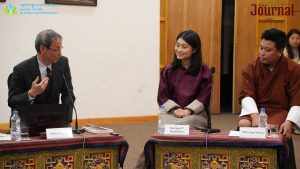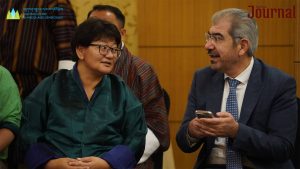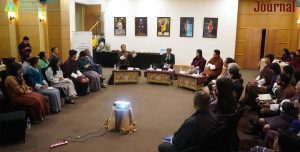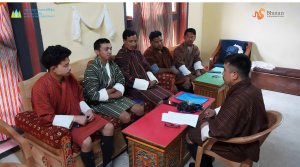June eNews
Knowledge-Sharing Session on GNH-Based Participatory Planning and Community Analysis
BCMD organised a one-day Knowledge-Sharing Session on GNH-Based Participatory Planning and Community Analysis on 28 of June at Thimphu. The event convened over 60 local government (LG) officials from Thimphu, Paro, Trashigang, Samdrup Jongkhar, and Trongsa, where previous training initiatives on GNH-Based Participatory Planning and Community Analysis have been conducted. Officials from the Department of Local Governance and Disaster Management were also in attendance.

The main objective of the session was to disseminate the benefits of the essential skills and practical tools acquired from previous training. Participants exchanged good practices implemented within their respective communities and engaged in co-learning activities. The platform also encouraged LG officials to discuss challenges faced in executing the tools and provided feedback on the effectiveness of the tool for improvement. Additionally, LG officials from the 12 gewogs in Tsirang Dzongkhag also participated in the event, as the training is being extended to Tsirang this year under “Project Mikhung 2.0- Capacitating the Local Government and Citizens to Strengthen People-Centred Planning.”

The initiative was designed to support inclusive planning processes and foster sustainable community-driven development initiatives. Through these efforts, BCMD aims to enhance the capacity of local government officials to effectively engage in participatory planning, ensuring that development initiatives are both inclusive and responsive to the needs of the community.
The project was supported by The Asia Foundation (TAF).
The Suja & Dzaw Conversation, “An Era of Transformation”
The Suja & Dzaw Conversation on the latest issue of The Druk Journal themed, “An Era of Transformation” was held on June 20 in Thimphu. The conversation was attended by 35 participants, including civil servants, development partners, researchers, educators, students, former members of the parliament, and entrepreneurs. Four speakers, who contributed articles to the issue, shared their perspectives on the various transformations unfolding in Bhutan.
Namgyal T Gyaltshen from DHI (Druk Holding and Investment) emphasised the critical role of technology and digital governance. She discussed the adoption of technology as a new pathway for economic growth and governance, stressing the importance of inclusion to ensure technology bridges societal divides. Challenges like infrastructure and connectivity were identified as areas needing improvement to leverage technology effectively.
Katsu Masaki highlighted the importance of community in Bhutan’s development. He advocated for integrating community-based projects, such as cooperatives and private investments in community resources, to ensure equitable development. Masaki emphasised that Bhutan must focus on indigenous knowledge and practices alongside modern advancements, aligning with Gross National Happiness (GNH) principles.


Philip Schellekens from UNDP underscored the existential challenges Bhutan faces, including the need to bridge disparities, address job insecurity, and meet Sustainable Development Goals (SDGs). He pointed out that despite past progress, Bhutan must adopt innovative and inclusive approaches to tackle future uncertainties like climate change and economic turbulence. He also spoke on the need to include the Bhutanese diaspora in Bhutan’s development.
Tshering Nidup from the Druk Gyalpo’s Institute discussed the Bhutan Baccalaureate system which aims to offer a holistic education model rooted in Bhutanese values. He pointed out the need to integrate humanities with STEM education and to break educational silos to foster collaborative learning environments. Tshering stressed the importance of transforming the current education system to reflect His Majesty’s vision and address real-world issues.
In a lively conversation, attendees shared feedback on digital technology, development, and their views on the topics in conversation.
The articles from the latest issue of The Druk Journal can be found here: https://drukjournal.bt/an-era-of-transformation/

The 19th issue of the Journal and the conversation was funded by UNDP Bhutan.
Baseline assessment on community consultation and planning processes in Tsirang District.
As part of Project Mikhung 2.0, BCMD recently conducted a baseline assessment across all 12 gewogs of Tsirang District. This assessment was carried out by Kuengha Consultancy. The primary objectives of the baseline assessment are as follows:
- To provide a clear understanding of the current public consultation and planning practices in Tsirang District.
- To evaluate the representation of marginalized groups, including people with disabilities, women, the elderly, youth, and the LGBT+ community, in community meetings.
- To assess the capacity and readiness of local government leaders in community planning.
- To understand the utilization of data at the community level for planning and decision-making.
Following the completion of the baseline assessment, workshops designed to equip local government leaders with the necessary tools for effective community engagement and planning processes will be carried out.


The project is funded by the Bhutan Foundation, and implemented by BCMD in close partnership with the Tsirang Dzongkhag Administration.
BCMD conducted its 59th Board Meeting
Bhutan Centre for Media & Democracy convened its 59th Board Meeting on 14th of June,2024.
The BCMD team offers our heartfelt gratitude to our dedicated board of directors for their unwavering commitment to fostering media and democracy in Bhutan.
